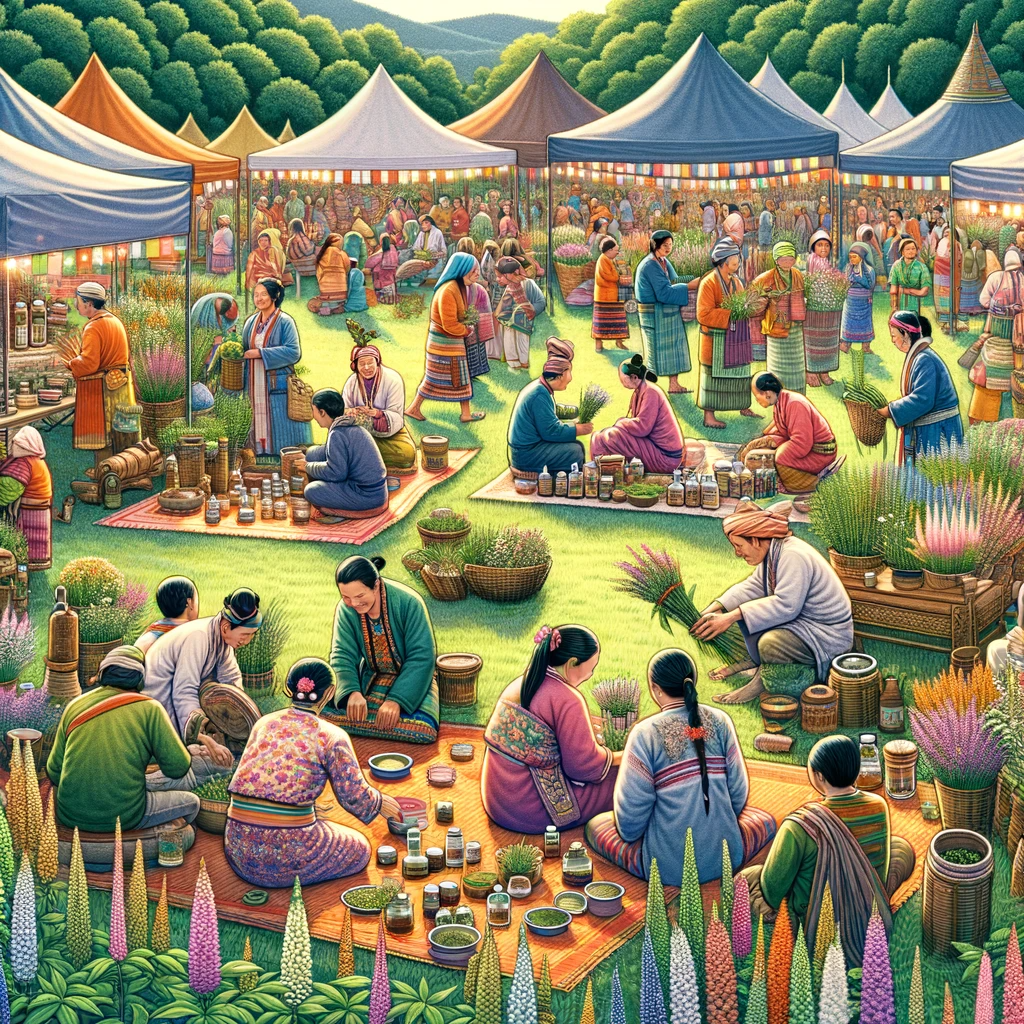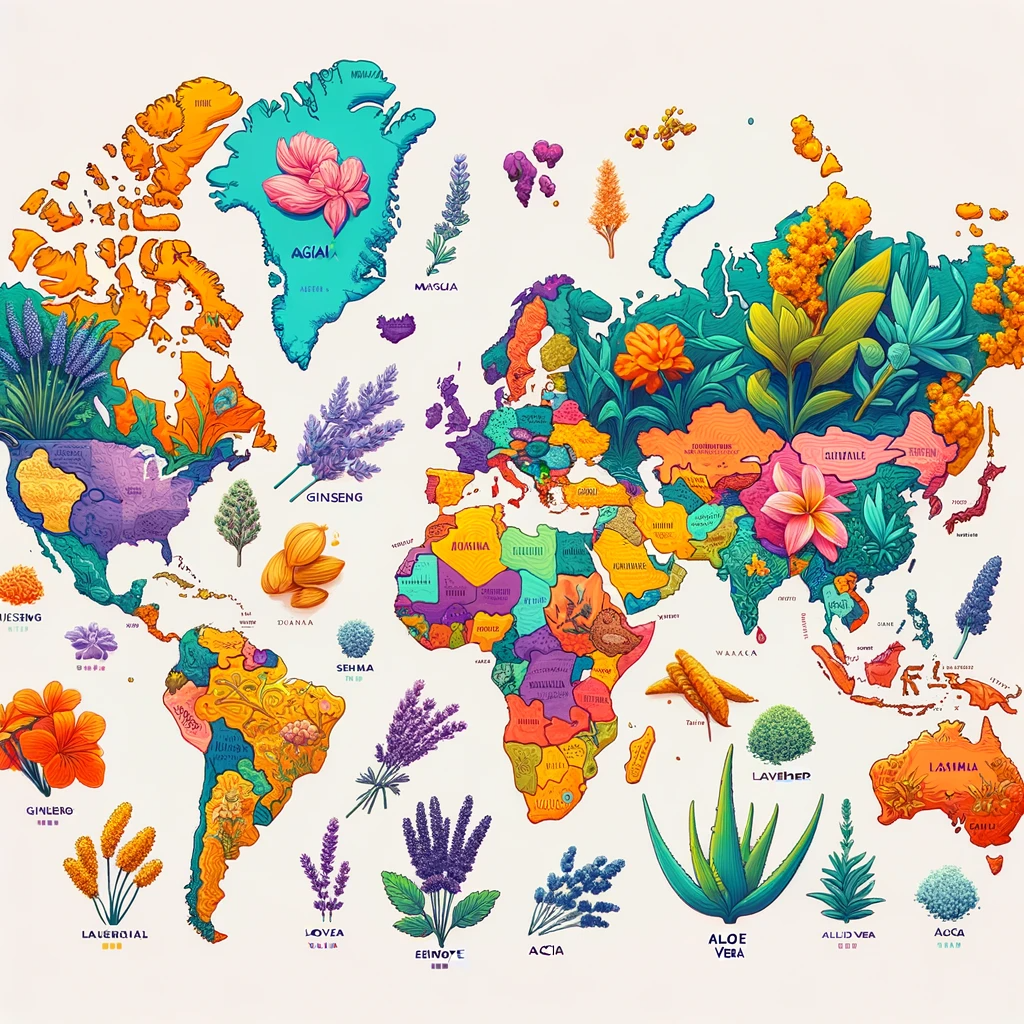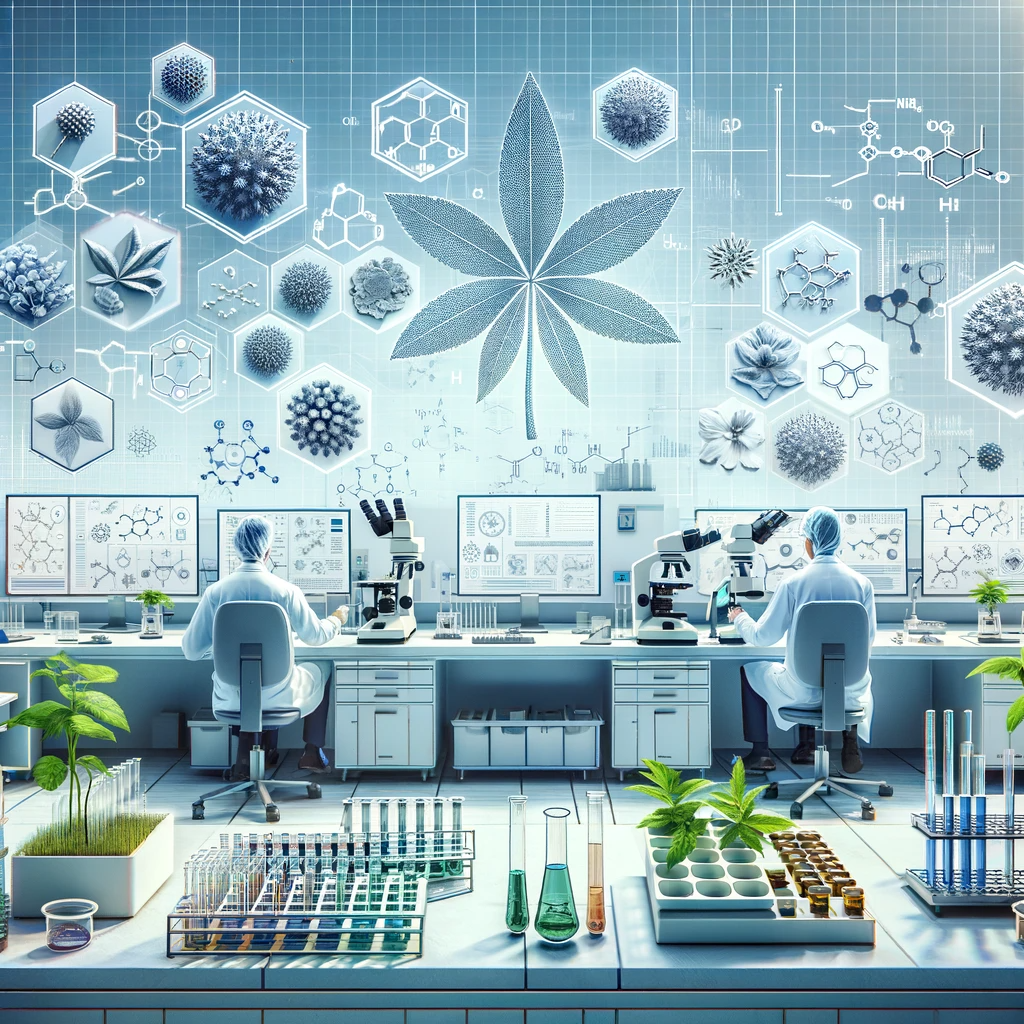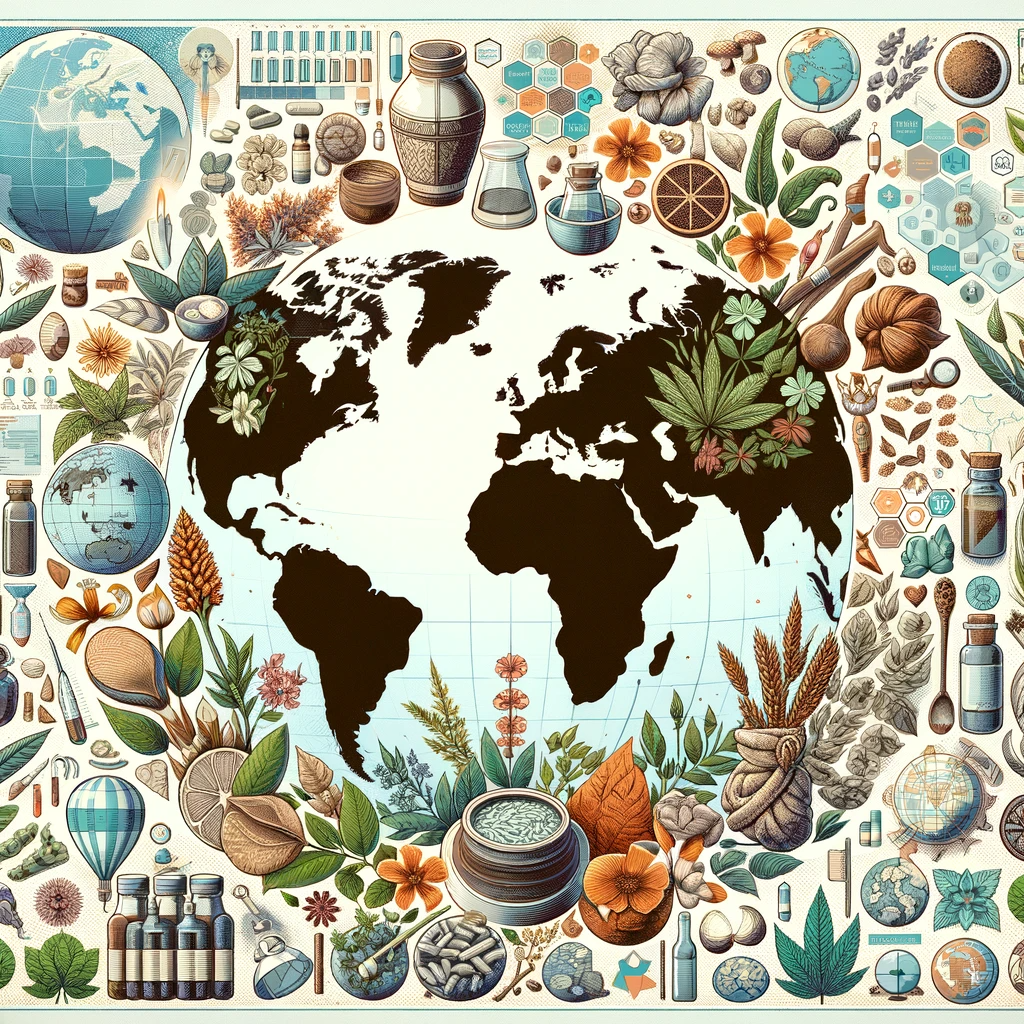Exploring Medicinal Herbs Around the World: Unveiling Healing Traditions

The use of medicinal herbs is a fascinating tapestry woven through the history of human civilization. Spanning across continents and cultures, these natural remedies have not only provided the foundation for modern medicine but also continue to play a vital role in healthcare today. This exploration delves into the diverse world of traditional medicine, showcasing the rich heritage and the continuous evolution of medicinal herbs around the globe.
The Roots of Herbal Medicine: A Historical Perspective
Herbal medicine has deep historical roots, with documentation dating back to 3000 B.C. This long-standing tradition reflects humanity’s earliest attempts to heal using the natural world. From the writings of ancient civilizations to the oral traditions of indigenous peoples, the use of herbs for healing is a common thread that connects different cultures and eras. Whether it’s the Ayurvedic practices of India, traditional Chinese medicine, or the indigenous healing customs of the Americas, each culture has developed its unique approach to using plants for medicinal purposes.
Diverse Healing Traditions: A Global Overview
Across the world, traditional medicine takes various forms, including acupuncture, herbal medicines, homeopathy, and more. Each of these practices offers a unique perspective on healing, often intertwined with the cultural and spiritual beliefs of the region. For instance, Ayurvedic medicine in India focuses on balancing the body’s energies, while traditional Chinese medicine uses herbs and acupuncture to restore balance and flow of Qi (energy).

The Role of Medicinal Herbs in Modern Healthcare
While ancient and steeped in tradition, medicinal herbs are not relics of the past. They continue to be relevant in modern healthcare, often complementing conventional treatments. For example, certain herbs are known for their effectiveness in treating psychosomatic illnesses. Modern research is increasingly focusing on understanding the healing properties of herbs and their potential integration into contemporary medicine.
Cultural Significance and Contemporary Practices
The use of medicinal herbs is not just about healing the body; it’s also deeply connected to cultural identity and practices. In many communities, traditional healers play a crucial role, sharing the same cultural beliefs and values as their patients. This connection enhances the healing process, making it more holistic and person-centered. Additionally, the spread of herbal traditions worldwide has led to a cross-cultural exchange of knowledge and practices, enriching the global understanding of medicinal plants.
Safety and Efficacy of Herbal Remedies
As with any form of treatment, the safety and efficacy of herbal remedies are of paramount importance. While many herbs have proven benefits, it’s essential to approach their use with an understanding of potential risks and interactions with other medications. The growing body of research and regulation in this field helps ensure that herbal remedies can be used safely and effectively, both in traditional settings and modern healthcare systems.

Harnessing the Power of Nature: Key Medicinal Herbs and Their Uses
Around the globe, various herbs have been recognized for their healing properties. Ginseng, ginger, and goji berries, for example, are not just culinary ingredients but also potent medicinal herbs used in various cultures. Ginseng is revered for its ability to boost energy and immune function, ginger is known for its anti-inflammatory and digestive properties, and goji berries are celebrated for their antioxidant benefits. Each herb comes with its own set of uses and benefits, addressing specific health concerns and promoting overall well-being.
The Intersection of Science and Tradition
The relationship between traditional herbal medicine and modern science is an evolving one. On the one hand, there’s a growing body of scientific research that validates the efficacy of many traditional remedies. On the other hand, there’s a rich, empirical knowledge base rooted in centuries of use. This intersection is leading to a more integrated approach to health and wellness, where the wisdom of the past informs the innovations of the future.
Tables and Lists: Enhancing Understanding
| Herb | Traditional Use | Modern Research Findings |
|---|---|---|
| Ginseng | Boost energy, immune function | Shown to improve immune response, potential anti-cancer properties |
| Ginger | Aid digestion, reduce inflammation | Proven anti-inflammatory effects, benefits for nausea and digestion |
| Goji Berries | Antioxidant, improve eyesight | High in antioxidants, potential to improve metabolic health |
Cultural Exchange and Global Healing Practices
The global exchange of medicinal herbs and knowledge is not just a transfer of information; it’s a fusion of practices that enriches each culture’s approach to health. As people travel and migrate, they bring their herbal traditions with them, leading to a dynamic and ever-evolving global health landscape. This exchange is a testament to the universal human quest for health and healing, transcending boundaries and uniting us in our shared need for wellbeing.
Holistic Health: A Comprehensive Approach
In the context of holistic health, medicinal herbs are more than just treatments for specific ailments; they are part of a larger approach to health that considers the physical, mental, emotional, and spiritual aspects of wellbeing. This comprehensive approach, often found in traditional healing systems, is gaining recognition in the modern health paradigm, emphasizing the interconnectedness of different aspects of health and the importance of maintaining balance.
The Future of Herbal Medicine: Trends and Innovations
The future of herbal medicine looks promising, with new trends and innovations emerging. One such trend is the growing interest in genetic influences on health and how herbal remedies can be tailored to individual genetic profiles. This personalized approach to herbal medicine could revolutionize how we understand and use these ancient remedies in modern healthcare contexts.
Another exciting development is the integration of technology in the field of herbal medicine. From advanced analytical techniques for identifying active compounds in herbs to the use of artificial intelligence for predicting herb-drug interactions, technology is playing a crucial role in advancing our understanding and use of medicinal herbs.

Highlighting Innovations: Table Format
| Innovation | Description | Impact on Herbal Medicine |
|---|---|---|
| Genetic Profiling | Tailoring herbal remedies to individual genetics | Personalized and more effective treatments |
| Technological Advancements | AI, analytics for compound identification | Enhanced understanding and safer use of herbs |
Herbal Medicine in the Digital Age: Online Resources and Education
The digital age has also democratized access to information about herbal medicine. Numerous online resources, courses, and communities are dedicated to sharing knowledge about medicinal herbs, their uses, and safety considerations. This easy access to information empowers individuals to make informed decisions about their health and explore herbal remedies with a better understanding of their benefits and risks.
Useful Online Resources
- Educational Websites: Providing detailed information about different herbs and their uses.
- Online Courses: Offering structured learning paths for those interested in studying herbal medicine.
- Community Forums: Allowing for the exchange of experiences and knowledge among herbal medicine enthusiasts.
The Role of Herbal Medicine in Holistic Wellness
Herbal medicine plays a crucial role in holistic wellness, aligning with the principles of treating the whole person. By considering the physical, emotional, mental, and spiritual aspects, herbal remedies contribute to a more balanced and integrated approach to health. This alignment with holistic wellness principles is a key reason for the enduring popularity and relevance of herbal medicine in today’s world.
Aligning with Holistic Wellness
- Physical Health: Addressing bodily ailments and promoting physical healing.
- Emotional Well-being: Herbal remedies can have mood-stabilizing and stress-reducing effects.
- Mental Clarity: Certain herbs are known to enhance cognitive functions and mental clarity.
- Spiritual Connection: Many cultures use herbs in spiritual practices, recognizing their deeper healing properties.
Bridging Traditional Wisdom and Modern Research
An important aspect of the ongoing evolution of herbal medicine is the bridging of traditional wisdom with modern scientific research. While traditional uses provide a rich foundation, scientific validation offers credibility and reassurance in the global health community. This synergy is crucial for the continued acceptance and integration of herbal medicine in mainstream healthcare.
Key Points of Synergy
- Empirical Knowledge: Traditional uses based on centuries of observation and practice.
- Scientific Validation: Modern research confirming the efficacy and safety of herbal remedies.
- Integrated Healthcare: Combining the best of traditional wisdom and modern science for holistic treatment approaches.

Ethical and Sustainable Practices in Herbal Medicine
With the increasing demand for medicinal herbs, ethical and sustainable practices are becoming crucial. This includes responsible sourcing, fair trade, and ensuring that the harvesting of wild herbs does not harm ecosystems. Promoting sustainability in herbal medicine not only protects natural resources but also supports the communities that rely on these herbs for their livelihoods and cultural practices.
Sustainability and Ethics
- Responsible Sourcing: Ensuring herbs are sourced in a way that does not deplete natural populations.
- Fair Trade: Supporting ethical practices in the trade of medicinal herbs.
- Environmental Conservation: Minimizing the ecological impact of herb cultivation and harvesting.
Conclusion: The Timeless Relevance of Medicinal Herbs
In conclusion, medicinal herbs around the world represent a rich and diverse tapestry of healing traditions. Their integration into modern healthcare, combined with a respect for traditional knowledge and an emphasis on sustainable practices, highlights their timeless relevance. As we continue to explore and understand these ancient remedies, they offer not only a connection to our past but also a promising path for the future of holistic health and wellbeing.